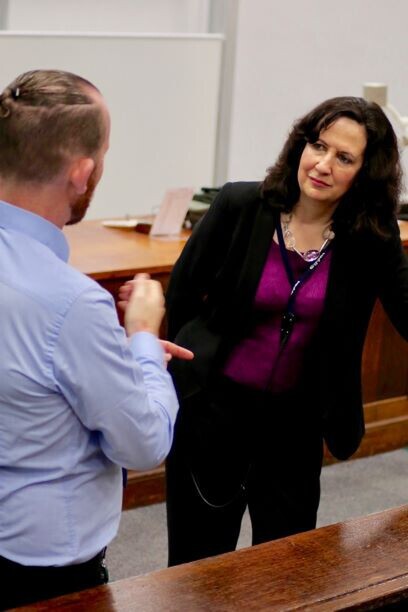How does a deaf lipreader spend their average Wednesday? For me as a self-employed person and co-Director of a social enterprise, Result CIC, last Wednesday was ordinary. But on reflection, it wasn’t. When you are rely mainly on lipreading for communication, every day offers fresh challenges as well as opportunities for more innovative communication. Here is what happened…
Morning: driving lesson
Yup – I got to the grand old age of 56 and three quarters without getting a driving licence. But as part of a personal resolution, I am now well on my way. Finding the right instructor when you cannot easily converse with them is tricky. Trying to lipread someone in profile is impossible and as the driver, turning to look at the person next to you is downright dangerous. The key quality you need is open-mindedness.
My fabulous teacher, John, has quickly picked up a range of clear gestures for giving directions on the road. He has joined a social media group of driving instructors who are working with D/deaf people and is picking up tips. He is even less keen on technology than me. When we stop for feedback, he is a dab hand with a marker pen on his laminated material. It is therefore a nice surprise to see him get his phone out and use a voice recognition app to record some of his key points. I am impressed with the ingenuity and (sometimes after a few tries) the resulting notes are helpful - and can also be sent and stored for future reference.
Late morning: online meeting with internal team
I feel very fortunate to have an Access to Work budget administered by the DWP (Department of Work and Pensions). I value this highly and prioritise the budget to provide professional lipspeakers for client meetings and delivery of training and coaching. For face-to-face internal meetings, my colleagues speak lipreadably, add finger spelling and some signs they have learned – and even keep their moustache/s trimmed! (Whiskery lips can be harder to read.)
For this online meeting with our London-based partners for our project developing new refugee social entrepreneurs I use my own voice recognition app, Otter AI, on my phone – putting this next to the computer. The level of accuracy is great for a topic and group with whom you are familiar, when there is a clear agenda and you know the likely vocabulary. It does struggle, understandably, with names though and insists on calling my colleague, Hormoz, ‘homeless’ or ‘Hamas’.
Afternoon: Live online external focus group
This is a 2-hour event with one of our biggest clients, working with a group of managers who I had never met before. I have booked professional lipspeakers to support this call. Basically, the event is ‘hybrid’: the lipspeakers are in the room with me, facing me as I sit at the screen for the online group call, relaying what was said. I choose to use lipspeakers who provide additional signs. This gives two channels for understanding what is said - a bit like a safety net - as less than half of English sounds are lipreadable and guessing for hours on end is exhausting. For me this hybrid method reduces the risk (and nerves) of not being able to access the discussion if there are technical glitches. It works incredibly smoothly.
I have a regular team of lipspeakers who are outstanding – professional, personable and skilled at getting round the occasional problems which complex communication can throw up. My lipspeakers are all stars and enhance my working life immeasurably. The focus group event went extremely well, partly due to the quality of the support. One of several challenges as a deaf professional is that communication is too often in the foreground – you cannot forget it and you have to carry out ‘meta-thinking’ as well as doing your actual job. On this afternoon, with excellent lipspeaking support, I could simply focus on the job.
Evening: orchestra rehearsal
That heading may have caused those of you who don’t know me to pause: ‘deaf person going to an orchestra rehearsal?’. Yes. I played viola as a hearing young person regularly until my mid-twenties when deafness started. After much heartache, a long gap then some expert teaching by a deaf professional player, I found a way to continue playing. The joy of playing music is hard to describe. And following the music on the page means it can actually be a lot easier than a conversation, which is spontaneous and can be unpredictable. The main challenge at rehearsals is when we stop playing and get suggestions and instructions from the conductor. This is where good comradeship kicks in. Fellow players help by noting changes on the music and answering my inevitable question ‘Where are we going from?’. One cellist has good BSL skills gained via family practice and is so helpful. In the tea break I lipread the conversation as best I could and a fellow viola player asked to use my Otter AI app to record the name of a book she recommends. The app doesn't like what she says for some reason, or maybe there is too much background noise, but after a few attempts it records her words ‘It’s not listening to me!’ The irony of the comment has us all falling about laughing.
The end of that Wednesday is an important moment. We are laughing together and sharing the experience. There had been at least six types of communication that day and all of them had been effective in their way. I believe that when we are encouraged to expand our communication range we all become more creative and think differently. It gives us new perspective. And, dare I say it, it can even be fun!
Interesting in improving your own communication? Why not contact Jane about individual coaching?
